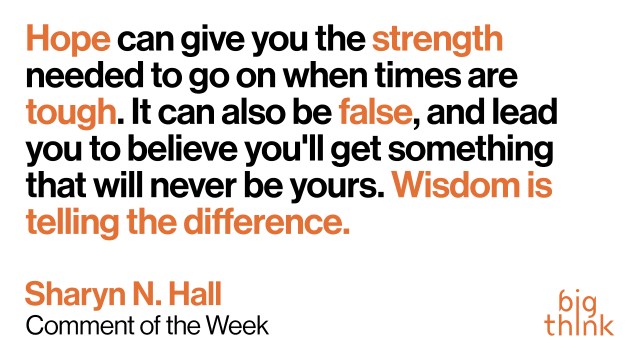How Hope and Optimism Affects Romantic Relationships

What role do hope and optimism play in romantic relationships? What happens when hope fluctuates or when one partner is more optimistic than the other?
The work of Eshkol Rafaeli, the professor of psychology at Bar-Ilan University, looks deeper at how hope works for couples, especially as they have their first child.
Rafaeli’s recent study focuses on expecting couples during the period that starts in the third trimester and leads to six months postpartum because it is “so full of expectations but also fears and dreads,” says the professor in a recent interview with Big Think.
The still-ongoing study, funded by the Hope and Optimism Initiative, aims to understand the nature of hope and how it functions as more than just an individual characteristic. Professor Rafaeli says that another important aspect of their work is to look at hope as a dynamic, fluctuating entity that changes over time. In particular, Rafaeli and his team of researchers at the Affect and Relationships Lab at Bar-Ilan University in Israel want to explore if hope can be contagious – can one person’s hope affect the other’s over a period of time? Can one person’s positive outlook carry both in the couple through a hard time?
The results of the latest study are still being analyzed but already the team sees some noteworthy facts. One that they observed is that the expectant mother’s hope seems to be highly influential on both in the couple, determining theirsense of relationship satisfaction and overall wellbeing.
“In other words there’s something about this period, maybe—we’ll have to see whether it’s just this period—that gives extra weight to hope on these expectant mothers more than the expectant fathers’ side,” explains Rafaeli.
The researchers think maybe there’s a shift that happens after the postpartum period and the affect of hope of the mother might fade. This is something they plan to further explore in the current study. For a future study, Rafaeli wants to see whether hope can be changed. Can people be trained to become hopeful as they pursue desired outcomes?
The effect of partners on each other was the focus of Rafaeli’s other recent study, published in the Journal of Family Psychology. It was conducted with researchers at Bar-Ilan University, Columbia University and the University of Texas at Arlington, who looked at how empathic accuracy affects relationship satisfaction. Empathic accuracy was defined as the “the extent to which people accurately perceive their peers’ thoughts, feelings, and other inner mental states.”
The scientists examined if how accurately people understood the mental states of their peers had an impact on their relationship satisfaction. What they found is that there is indeed a correlation between the two, especially when a partner’s negative emotions were involved.The findings suggested that looking at how partners in a relationship understand each other can lead to improving relationship satisfaction. In particular, the strongest affect of empathic accuracy seemed to be exhibited in couples who’ve been together for a few years.
Another 2017 study, from a team of researchers at Università Cattolica del Sacro Cuore in Milan, Italy and University of Fribourg in Switzerland, investigated the effect of optimism when one partner is perceived to withdraw from the relationship. The study, evocatively titled “Keeping calm when riding the rapids: Optimism and perceived partner withdrawal,” found that optimists were able to deal easier with their partners pulling back from the relationships.
The researchers discovered that more optimistic partners were less reactive, threatened or feeling rejected in situations when the other partner preferred to be alone. The results suggest that “optimism may foster more benign and secure representations of the self, others, and the social world, thereby promoting the appraisal of negative events as reversible,” write the scientists. The conclusions point to the stress-protective importance of optimism as a mechanism of adaptation to circumstances that befall a couple once the honeymoon period ends and the stress of daily life takes toll.
A 2016 study authored by Andy J. Merolla of Baldwin Wallace University in Ohio and Jennifer J. Harman from Colorado State University, looked at the effects of hope rather than optimism on managing conflict in a relationship. The researchers defined hope according to the theory of hope developed by the psychologist Rick Snyder, as “the belief that the future holds promise and that goals are attainable, even if obstacles arise to block one’s goal pursuit.” Hope in a relationship would relate to how hopeful the partners are about the relationship’s future and, by extension, it’s health.
The study found that hope plays an important role during conflict situations by allowing a partner to accommodate the other, even one who is engaged in destructive behavior. In particular, a hopeful outlook can help facilitate communication, necessary to getting through difficult moments in a relationship. This conclusion builds on an older study that found hope-oriented counseling for individual couples improved their relationship satisfaction.





